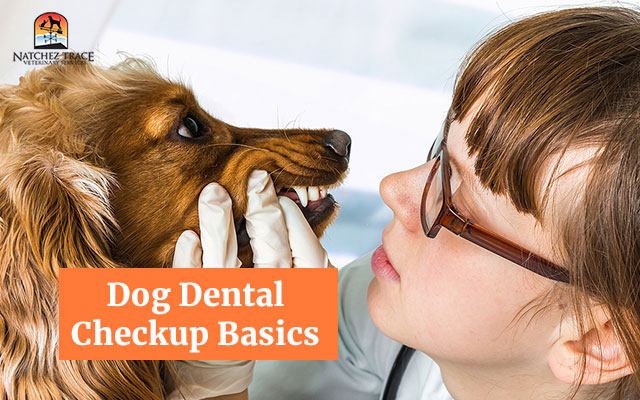A dog dental checkup is key to your pet’s overall health.
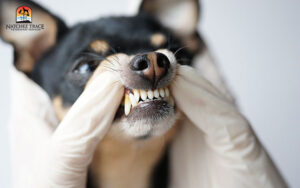 Your dog’s dental health isn’t just about fresh breath or shiny teeth—it is crucial to their overall well-being. Poor oral hygiene can lead to painful conditions like gum disease, tooth loss, and even serious health risks, including infections that may affect the heart, kidneys, or liver.
Your dog’s dental health isn’t just about fresh breath or shiny teeth—it is crucial to their overall well-being. Poor oral hygiene can lead to painful conditions like gum disease, tooth loss, and even serious health risks, including infections that may affect the heart, kidneys, or liver.
Regular checkups help catch problems early and keep your dog comfortable and healthy. From professional cleanings to at-home care, maintaining those canine teeth ensures your furry friend stays happy and full of life.
Learn more in this video:
Why Are Dog Dental Checkups Important?
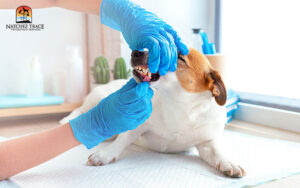 It’s not just about fresh breath!
It’s not just about fresh breath!
Routine dental checkups do more than keep your dog’s breath smelling fresh. They’re crucial for preventing common dental problems in dogs that can lead to serious health issues.
Here’s why regular checkups matter:
- Prevent tartar buildup: Plaque hardens into tartar, irritating gums and leading to infections.
- Avoid gum disease: Gingivitis and periodontitis can cause pain and tooth loss if left untreated.
- Spot early signs of trouble: Regular exams can detect issues like cracked teeth, inflamed gums, or oral tumors early.
- Protect overall health: Poor dental hygiene can lead to infections that affect the heart, liver, and kidneys.
By prioritizing your dog’s dental health, you’re helping them stay happy and healthy.
Signs Your Dog Needs a Dental Checkup
Is your dog hiding tooth pain?
Dogs are masters at masking discomfort, but dental pain often shows through subtle signs. Recognizing the signs early can prevent serious health issues.
Common Symptoms to Watch For:
- Bad breath (halitosis): Persistent bad breath can signal dental disease.
- Red, swollen, or bleeding gums: All are signs of gingivitis or more severe gum issues.
- Difficulty chewing or loss of appetite: Your dog may avoid eating if chewing is painful.
- Yellow or brown tartar buildup: Visible tartar often leads to gum irritation and tooth decay.
- Loose or missing teeth: Advanced dental disease can cause teeth to loosen or fall out.
If you notice any of the above symptoms, a dog dental checkup is essential to address the problem and keep your pet comfortable.
What Happens During a Dog Dental Checkup?
Curious about what happens during a dog dental checkup?
A comprehensive dental exam identifies potential issues early and maintains your dog’s oral health.
Below is what you can expect during a typical visit.
Steps in a Dental Checkup:
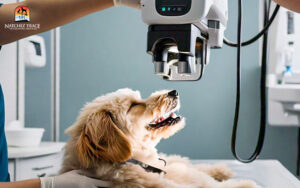 Visual examination of the mouth: The vet will inspect your dog’s teeth and gums for visible signs of trouble, like tartar buildup, redness, or swelling.
Visual examination of the mouth: The vet will inspect your dog’s teeth and gums for visible signs of trouble, like tartar buildup, redness, or swelling.- Checking for signs of gum disease or tooth damage: They’ll look for indicators of periodontal disease, loose teeth, or fractures.
- X-rays to assess root and jaw health (if needed): Dental X-rays help detect hidden problems beneath the gum line, like infections or bone loss.
- Discussion of treatment or cleaning options: Depending on the findings, the vet may recommend a professional cleaning or further treatment to address any dental issues.
Regular dental checkups ensure your dog’s mouth stays healthy and pain-free!
Learn what happens during a dog dental checkup, along with some bonus tips in the following video:
Common Dental Problems in Dogs
Dogs can suffer from various dental issues, just like humans.
These problems can lead to discomfort, tooth loss, and even serious health issues without proper care. Here are some of the most common dental problems in dogs:
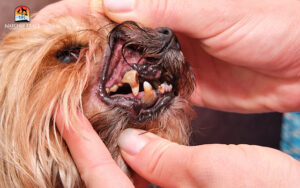 Top Dental Issues in Dogs:
Top Dental Issues in Dogs:
- Tartar and plaque buildup: Tartar and plaque are a common starting point for dental issues, causing discoloration and bad breath.
- Gingivitis (gum inflammation): Gingivitis is early-stage gum disease. Its signs are redness, swelling, and bleeding along the gum lines.
- Periodontal disease: Periodontal disease is a serious oral health condition that affects not just the gums but also the deeper structures that support the teeth, such as the bone and connective tissues. If left untreated, it can cause significant damage, including gum recession, infection, and the eventual loosening or loss of teeth.
- Tooth fractures: Tooth fractures are often caused by chewing on hard objects, leading to pain and possible infection.
- Oral tumors or growths: Abnormal growths like an epulis can form in the mouth, requiring veterinary attention.
Understanding common issues can help you proactively protect your dog’s dental health.
Benefits of Regular Dog Dental Cleaning
Why is professional cleaning a game-changer for your dog?
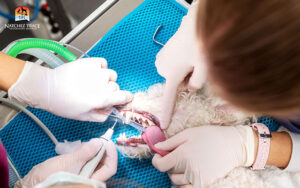 Regular dental cleanings by a vet do more than simply freshen your dog’s breath. They play a critical role in maintaining overall health and preventing serious dental issues that could lead to costly treatments later.
Regular dental cleanings by a vet do more than simply freshen your dog’s breath. They play a critical role in maintaining overall health and preventing serious dental issues that could lead to costly treatments later.
Here’s why professional cleaning matters:
- Deep cleaning: Removes tartar and plaque buildup below the gum line; areas brushing at home can’t reach.
- Prevention of gum disease: Regular cleanings help prevent gingivitis and more advanced periodontal disease.
- Early detection: Vets can spot potential issues early on, such as loose teeth, infections, or oral tumors.
- Improved overall health: Dental health impacts other systems, like the heart, liver, and kidneys, especially in smaller breeds.
Prioritizing regular dental cleanings now can prevent your pet from suffering unnecessary pain and help you avoid the need for more invasive and costly treatments in the future.
But how do you know when to visit the vet for a dog dental cleaning? Watch the following video to know more:
Tips to Maintain Your Dog’s Dental Health at Home
Prevention starts with daily care.
Keeping your dog’s teeth clean between checkups is easier than you think! You can help prevent dental problems and keep your pet’s smile healthy with a few simple habits.
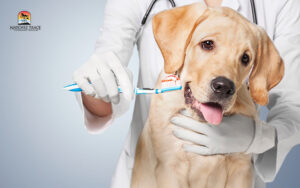 Daily Dental Care Tips:
Daily Dental Care Tips:
- Brush regularly: Use a pet-safe toothbrush and toothpaste. Aim to brush at least two to three times a week, but daily is even better.
- Dental chews and toys: Dental chews and toys reduce tartar buildup while keeping your dog entertained.
- Dental-friendly diet: Look for kibble or wet food specifically designed to promote dental health. Some foods help scrape away plaque as your dog chews.
Adding these steps to your routine will reduce the risk of gum disease, tooth decay, and bad breath—keeping your pup happy and healthy!
When to Schedule a Dog Dental Checkup
Don’t wait for a problem!
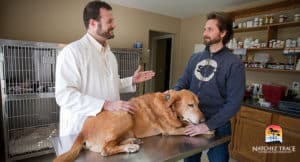 Regular dental checkups catch potential issues early, preventing them from escalating into serious problems. Detecting concerns in their initial stages can spare your dog from painful procedures and ensure their overall health and well-being.
Regular dental checkups catch potential issues early, preventing them from escalating into serious problems. Detecting concerns in their initial stages can spare your dog from painful procedures and ensure their overall health and well-being.
Regular checkups also help vets catch common dental issues like tartar buildup, gingivitis, and early-stage periodontal disease. Catching these problems early means less invasive treatments and a quicker recovery for your dog. Plus, it prevents the need for expensive, complex procedures down the road.
By scheduling regular dental exams, you’re taking a proactive step to ensure your pet’s teeth—and health—stay in top condition!
Conclusion
Keeping up with dog dental checkups can make a big difference.
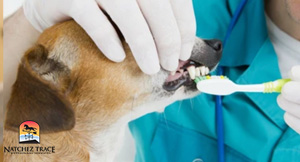 Regular dental care is vital for your dog’s long-term health and well-being. Just like humans, dogs need routine checkups to ensure their teeth remain strong, clean, and free of painful problems. Keeping up with regular checkups can prevent dental issues before they escalate, ensuring your dog has a happy, healthy mouth.
Regular dental care is vital for your dog’s long-term health and well-being. Just like humans, dogs need routine checkups to ensure their teeth remain strong, clean, and free of painful problems. Keeping up with regular checkups can prevent dental issues before they escalate, ensuring your dog has a happy, healthy mouth.
Proper dental care can also help prevent more severe health issues that stem from poor oral hygiene, like heart disease or kidney problems. A strong, healthy bite is more than just a smile—it’s essential for your dog’s overall health and quality of life. Regular checkups give you peace of mind, knowing you’re doing everything possible to maintain your pup’s health and comfort.
Schedule Your Dog’s Dental Today
FAQs:
- How often should my dog have a dental checkup?
Dogs should have their teeth checked at least once a year. This helps catch dental issues early and maintain overall health. - What are the signs of dog tooth pain?
Look for bad breath, difficulty chewing, drooling, or pawing at the mouth. These could indicate tooth pain or other dental issues. - Is professional dog dental cleaning necessary?
Yes, professional cleaning removes plaque and tartar that home care can’t, preventing gum disease and other serious issues.

